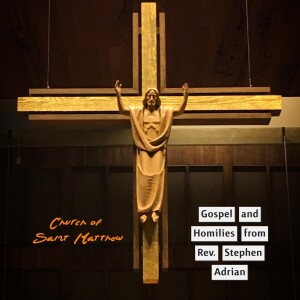
Sunday Apr 16, 2023
06.14.2020 Homily
Today, we celebrate the feast of the body and the blood of Christ. In St. John's gospel Jesus gives this very, very long teaching about the Eucharist. And there's something about that teaching and the sixth chapter that is very different from the teaching that is given in Matthew, Mark, and Luke. You see in Matthew, Mark, and Luke, and the story of the last supper, Jesus says, this is my body. Take it. This is my blood. Drink it.
In John. Jesus says, unless you eat the flesh of the son of man and drink his blood, you can have no life in you. The word body is a, is a generalized term, But where word flesh is very particular. The word flesh is the meat that you and I carry on our bones. In fact, in some languages, the word or flesh is also the word for meat. Flesh, the word for flesh and the word for meat. Well, out of that distinction, there are a number of ways of appreciating and understanding the sacrament. Now sacraments admit of a variety of interpretations and a variety of meetings. The sacramental signs are very full and very rich. Some would hold that primary image for what you and I do here Sunday after Sunday is that this is the sacrifice of the mass and that what we do at this alter is we recall Calvary. We recall Jesus dying for our sins. We recall that moment in which all is made right with God. Where reconciliation occurs. And so this is the, the reenactment, the re presentation of that sacrifice of the cross. In the old catechism, it used to be called the, the unbloody sacrifice of the cross.
So in that understanding, the Eucharist is sacrifice. Now, the other understanding or an other understanding of the Eucharist is as in St John's this gospel, the Eucharist is food to be eaten. The Eucharist is meal. If you eat my flesh and drink my blood, you will have life in me. And I will raise you up on the last day. And my flesh is real food. And my blood is real drink. Those who eat my flesh and drink my blood abide in me and I in them.
What we do then week after week, as we gather at the table of the Lord is we gathered to be fed that the, the primary focuses that we are a community gathered around a table, and that we are being fed with the risen Lord. And that in our receiving that gift of the risen Lord, there is the promise of eternal life.
Now, those two approaches are not in opposition to each other. They're just two different ways of looking at the one reality. If you opt for the, the image of the Eucharist as sacrifice, then there really is no absolute need for the Eucharist to be celebrated every Sunday. The Eucharist could be celebrated a couple times a year, or like Passover could be celebrated once a year. It becomes then the, the focal for the sacrifice of Jesus. And maybe in that kind of reading, the sacrament truly does belong within the Holy week. But if you, if you see the gift of the Eucharist as food, then you've got to do this regularly. You've got to do this daily. You've got to do this week after week after week, because you cannot live without food. And just as the food we take in our homes, nourishes our physical lives. So the food that is shared here at the table of the Lord day after day after day after day is food that feeds our spiritual life.
The celebration today is the celebration of, of the Eucharist. The Eucharist is different from the blessed sacrament. The blessed sacrament is the words that are used to describe the body and blood of the Lord that is reserved after mass in the tabernacle. It is the blessed sacrament that is made present for adoration and prayer. What we do around this table is not the blessed sacrament. The blessed sacrament is what is the leftover. If you will, from the table, what we do around the table is the Eucharist. And the Eucharist is a process of giving. Thanks. The Eucharist involves a community gathered at a table. The Eucharist is by its very definition a communitarian experience.
So in a few weeks, there will be young people. Most of them, second graders will receive the Eucharist for the first time they'll receive the body and blood of Christ they'll receive communion, but more importantly, they will be invited to this table for the first time. The Eucharist is rich. The sacrament is rich. The church has chosen. The church has adopted. The church has taken to itself. If you will. The teaching of John's gospel, where the church, this is bread, the bread from heaven. And as we pray the Lord's prayer before communion, that's what we pray for. Give us this day, our daily bread, the food that we need day after day after day so that our spiritual lives may be nourished.
No comments yet. Be the first to say something!